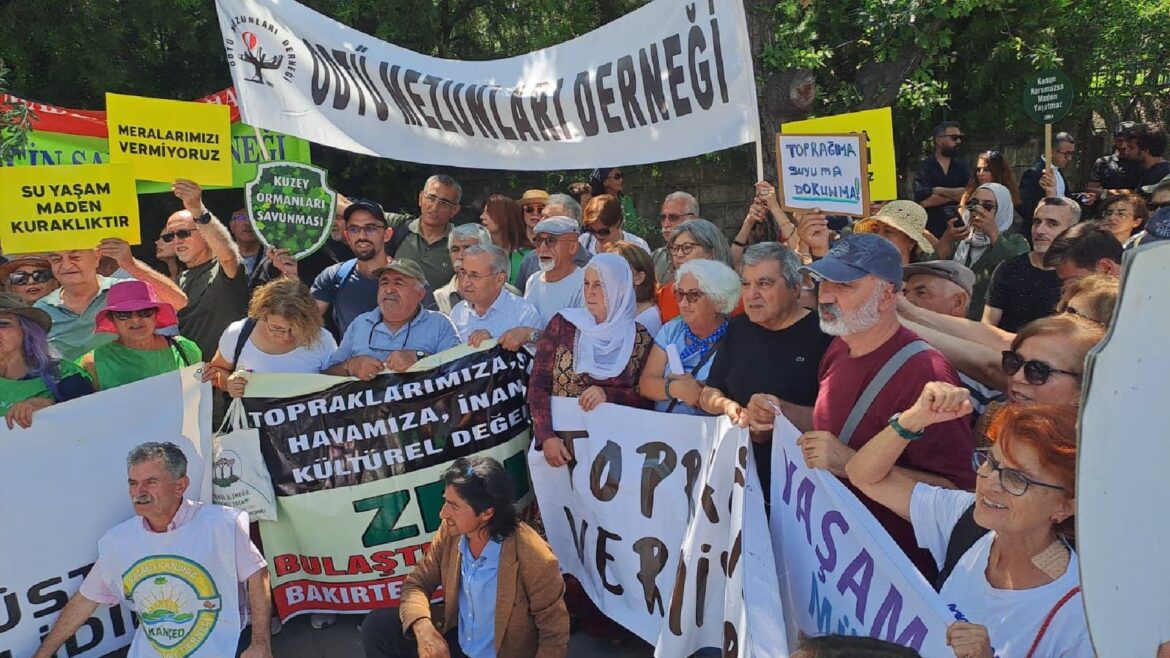Summary
Controversial legislation in Turkey allows for mining in olive-cultivated areas to enhance energy production, with the law permitting companies to lease agricultural land for coal extraction. The new measure aims to increase Turkey’s energy self-sufficiency and has faced opposition from farmers, environmental groups, and opposition politicians, leading to physical clashes in Parliament. The law includes a provision requiring the planting of two olive trees for each one felled, but critics argue that replacing older trees with younger ones may not be effective in maintaining olive production potential.
Controversial new legislation in Turkey allows for the exploitation of the country’s forests and agricultural land, including olive-cultivated areas, for mining for fossil fuels to supplement the country’s energy production.
The provision is included in an omnibus bill passed by the Turkish parliament in July. It permits companies to lease olive groves and other agricultural land for lignite coal extraction for a period of ten to 20 years.
According to its promoters, the new measure is intended to make Turkey more self-sufficient in energy production.
See Also:Turkish Olive Farmers Struggle Despite Expected Record Harvest
The previous attempt of the Turkish government to open up olive groves to mining operations was rejected by the country’s parliament.
Under the new law, a board appointed by the Turkish president will examine the proposed mining projects and either green-light them or not based on the country’s energy needs.
If a project is approved, the mining company will be able to override the existing development protection status of certain areas and bypass environmental requirements under certain circumstances.
The law also designates two separate areas in the Turkish province of Muğla, one of the country’s most prominent olive-growing regions, which is also rich in lignite reserves, as critical mining zones.
The law was met with fierce opposition from farmers, environmental groups and Turkish politicians of the opposition.
Physical clashes took place in the Turkish Parliament between lawmakers from the ruling Justice and Development Party (AKP), who proposed the legislation and parliamentary members from the main opposition Republican People’s Party (CHP).
“On one side is the thousand-year labor of the villager. On the other hand, the five-to-ten-year profit of a few bosses,” said Tahsin Ocakli from the CHP. “And that’s the point.”
Farmers from across Turkey went on a hunger strike in a park near the Parliament building while the proposed legislation was discussed to protest the bill.
To ease the widespread protests, a requirement was added to the law requiring the planting of two olive trees for each olive tree felled or relocated for mining.
However, critics argued that olive trees can live on and remain productive for hundreds of years, so replacing centenarian olive trees with younger trees would prove inefficient in retaining an area’s potential for olive production.
The Turkish coal producers association (YEKÜD), on the other hand, said that olive trees in the areas selected for coal mining will be relocated instead of being cut down and more olive tree saplings will be planted.
“Energy independence is a national security issue,” said the association’s board chairman, Fatma Elif Yağl. “Turkey must reduce its foreign dependency by using its domestic resources at the highest level…Olive trees will not be cut, but will be carefully moved.”
While renewable energy is gaining ground in Turkey, fossil fuels remain the country’s main fuel source for electricity production.
In 2023, half of the country’s energy needs were covered by burning coal and oil, according to the International Energy Agency (IEA), while only around 12 percent came from renewable energy sources.
The country is also among the world’s most significant olive oil and table olive producers, with the national production exceeding 400,000 metric tons for olive oil and 700,000 tons for table olives in bountiful years.
In Muğla’s Milas district in the southwest of the country, local olive farmers were stunned to find out that part of the district has been identified as an essential mining area by the new law.
“This is the first time something like this has happened to us,” said Hüseyin Uzun, an olive farmer from Hasanlar, a village within the designated area for mining. “We were devastated to learn that our village was within the coordinates outlined in the bill. I have over 300 trees, all of which I planted myself. I nurtured them like children.”
A 2022 study also found that the expansion of the Milas olive oil sector would be more beneficial to the local economy than coal mining.
Turkey has long been safeguarding its olive-growing areas. The Olive Cultivation Law — officially known as Law No. 3573 — was first enacted in 1939 to protect the country’s olive groves and boost olive production.
The law specified that no plant facilities emitting dust or chemical waste could operate closer than three kilometers from olive-cultivated areas. Over the past decades, several failed attempts by Turkish lawmakers took place to overturn the legal protection given to olive groves from industries threatening to encroach on their land.
“This time, the amendment doesn’t just erode the olive law, it directly contradicts it,” said Emel Türker-Alpay, climate and energy campaign consultant for Greenpeace Turkey. “By introducing vague ‘exceptions,’ it opens the door to systematic destruction of protected groves.”


Dining and Cooking